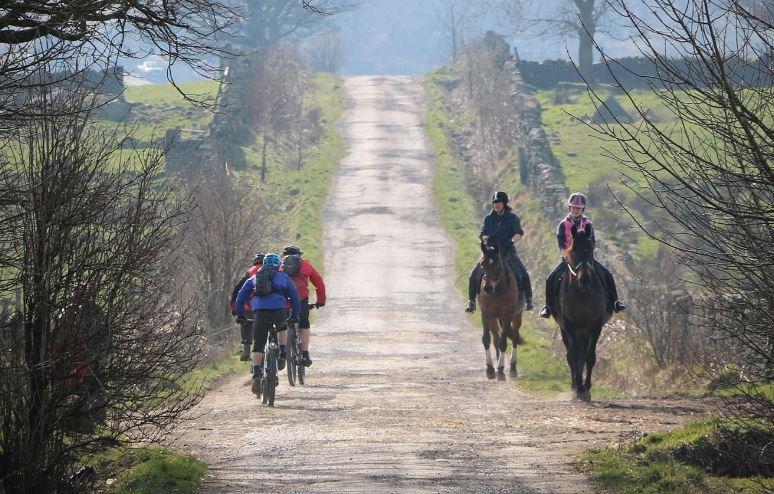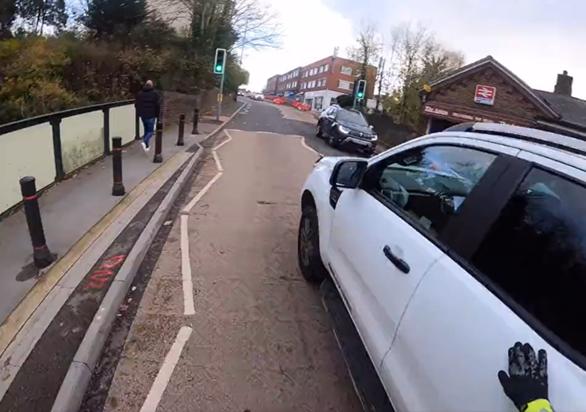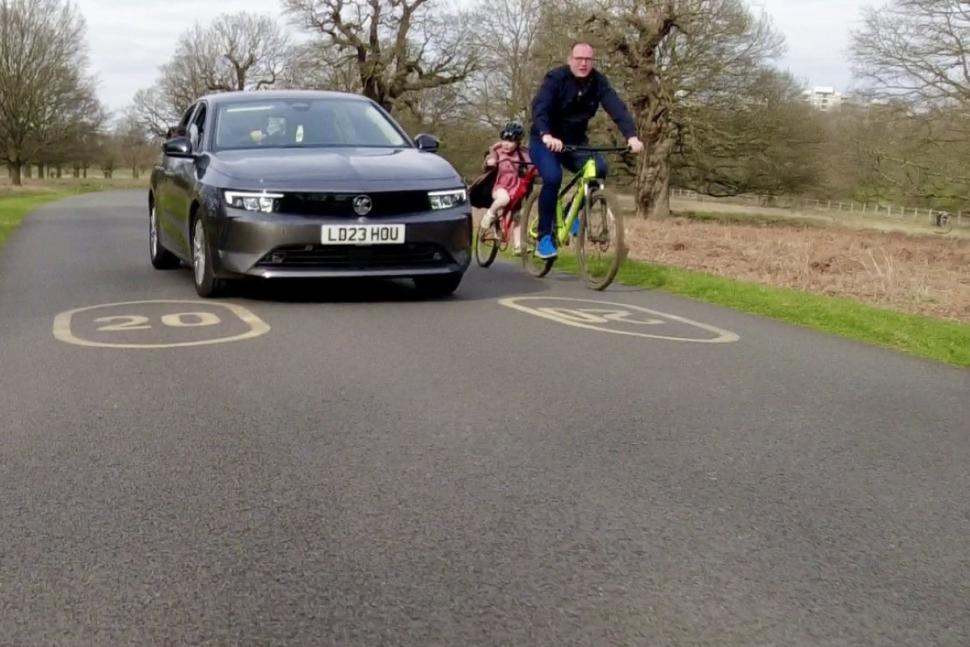- News
- Reviews
- Bikes
- Accessories
- Accessories - misc
- Computer mounts
- Bags
- Bar ends
- Bike bags & cases
- Bottle cages
- Bottles
- Cameras
- Car racks
- Child seats
- Computers
- Glasses
- GPS units
- Helmets
- Lights - front
- Lights - rear
- Lights - sets
- Locks
- Mirrors
- Mudguards
- Racks
- Pumps & CO2 inflators
- Puncture kits
- Reflectives
- Smart watches
- Stands and racks
- Trailers
- Clothing
- Components
- Bar tape & grips
- Bottom brackets
- Brake & gear cables
- Brake & STI levers
- Brake pads & spares
- Brakes
- Cassettes & freewheels
- Chains
- Chainsets & chainrings
- Derailleurs - front
- Derailleurs - rear
- Forks
- Gear levers & shifters
- Groupsets
- Handlebars & extensions
- Headsets
- Hubs
- Inner tubes
- Pedals
- Quick releases & skewers
- Saddles
- Seatposts
- Stems
- Wheels
- Tyres
- Health, fitness and nutrition
- Tools and workshop
- Miscellaneous
- Tubeless valves
- Buyers Guides
- Features
- Forum
- Recommends
- Podcast
 Cyclists and horses (licensed CC BY SA 2.0 on Flickr by Michael Podger)
Cyclists and horses (licensed CC BY SA 2.0 on Flickr by Michael Podger)Drivers “surprised and happy” to see horses on the road – but “frustrated, angry, and anxious” when overtaking cyclists, new road rage study finds
Motorists are most likely to experience feelings of surprise or happiness when encountering and having to overtake horses and horse riders on the road – but anger, frustration, and anxiety when faced with the same situation involving a cyclist, a new study examining the role of mindfulness when passing vulnerable road users has found.
The research, carried out on behalf of the British Horse Society, also found that 80 per cent of drivers agree that motorists are held up by cyclists when in a rush, while seven out of ten drivers surveyed agreed that cyclists are unpredictable, can appear from nowhere, and don’t obey road rules.
Published last week, the Road Safety Trust-funded project was undertaken by David Crundall, Editha van Loon, and Katherine Bailey from Nottingham Trent University, and surveyed over 1,000 drivers on how they feel, think, and behave around vulnerable road users such as cyclists and horse riders in a bid “to better understand their emotions, attitudes, and behaviours”.
> Cycling UK and British Horse Society issue guidance to cyclists on how to overtake horses safely
As part of the study, the 1,006 drivers from across the UK who took part in the online questionnaire were asked how often they feel a range of emotions – including frustration, happiness, surprise, anger, contempt, and anxiety – when “faced with cyclists, horse riders, or motorcyclists in the road ahead”.
32 per cent of those surveyed reporting feeling frustrated towards cyclists “often” or “nearly always”. 20 per cent, meanwhile, reported the same frequencies of anxiety around cyclists, and 16 per cent said they were often or nearly always angry at people on bikes on the road.
In comparison, only two per cent said they were often or nearly always angry when faced with horses and horse riders on the road (though those behind the study noted that this still amounts to 24 of the 1,006 drivers surveyed, described as a “sizeable minority with extreme views”).
Over three-quarters of those surveyed said they felt frustration towards cyclists at least sometimes, with almost half experiencing anger occasionally. Under a quarter of respondents, meanwhile, said they never or almost never felt angry when passing a cyclist on the road.
The motorists were then asked to share how often they engage in risky or aggressive behaviour around vulnerable road users. 24 per cent said they shout or gesticulate at cyclists at least sometimes, with two per cent admitting that they frequently or almost always shout at cyclists.
Around a quarter of the drivers also said they sometimes follow cyclists at or less than a car’s length behind them (with around 15 per cent revealing that they frequently or almost always follow cyclists at close proximity), with roughly the same number admitting they leave people on bikes less than 1.5m space when passing. 40 per cent admitted overtaking cyclists at or above the speed limit for the road.
Between 20 and 30 per cent of drivers also said they sound their horn or rev their engine at cyclists before passing them.
Horses, however, appear to evoke much fewer instances of negative behaviour, with an average of 97 per cent saying they never engage in aggressive behaviour towards the animals and their riders on the road.
> Look out for horses — here's how to pass horse riders safely
Finally, when focusing on attitudes towards cyclists, 81 per cent said they strongly or somewhat agree that drivers may be in a rush and are held up by cyclists, while around 70 per cent agreed that cyclists are “unpredictable” and “can appear from nowhere”.
68 per cent also agreed with the statement that “cyclists don’t obey road rules” and around 55 per cent agreed that drivers may be stressed about something else and take it out on cyclists, that packs of leisure cyclists can be intimidating, and that cyclists “act arrogantly”.
Just under half (48 per cent) also strongly or somewhat concurred that cyclists should pay “road tax” (despite the fact it doesn’t exist) and 26 per cent agreed that cyclists “shouldn’t be on the roads”.
In their free-form text responses to the questionnaire, some drivers expressed annoyance that cyclists “are slowing down traffic”, with one noting that “I am often in a rush and with time deadlines to get somewhere, so the hold-up of staying behind a cyclist holds me up far too long”.
Road position and riding two-abreast also formed a significant portion of the responses, with some arguing that “commuting cyclists… ride in the middle of the road making it hard to pass” and that “cyclists are very rude and ride in the middle of the road so that you can’t overtake”.
“Recreational expert cyclists often ride deliberately next to each other to slow other [road] users down,” another respondent said.
Other responses were even more forthright, and included claims that cyclists – or “Lycra warriors”, as one respondent described them – “are selfish and dangerous and think they own the road at times” and are “arrogant arseholes”.
“When there is a cycle path and it’s not being used, we always shout ‘use the cycle path psychopath!’” one of the motorists added.
This data was subsequently assessed by mindfulness experts, with a group of drivers then treated to a four-week training intervention, where they were shown newly crafted scripted videos which aimed to tackle a lack of knowledge about unsafe passing behaviours by providing information on how to overtake vulnerable road users, provide persuasive arguments to reframe motorists’ attitudes towards cyclists, and offer mindfulness techniques to combat in-the-moment emotions such frustration and anger.
According to the report, the four videos had a positive effect on the attitudes and emotions, particularly concerning frustration, of the drivers towards cyclists, and that their intended future overtaking speeds have decreased, along with a decrease in their unsafe passing behaviours.
The motorists who took part in the online course also said the videos would be of great benefit for other drivers, reckoning that their knowledge, attitudes, and level of control when overtaking had improved, and that they would use the recommended safe passing and mindfulness techniques in practice.
After obtaining a PhD, lecturing, and hosting a history podcast at Queen’s University Belfast, Ryan joined road.cc in December 2021 and since then has kept the site’s readers and listeners informed and enthralled (well at least occasionally) on news, the live blog, and the road.cc Podcast. After boarding a wrong bus at the world championships and ruining a good pair of jeans at the cyclocross, he now serves as road.cc’s senior news writer. Before his foray into cycling journalism, he wallowed in the equally pitiless world of academia, where he wrote a book about Victorian politics and droned on about cycling and bikes to classes of bored students (while taking every chance he could get to talk about cycling in print or on the radio). He can be found riding his bike very slowly around the narrow, scenic country lanes of Co. Down.
Latest Comments
- HalfDanHalfBiscuit 2 hours 24 min ago
Per capita thefts isn't all that useful a metric as it doesn't take into account levels of bike ownership. Cambridge is probably the cycling...
- Critman 3 hours 50 min ago
"30mm outer diameter 18mm inner diameter 13.4mm". Good luck finding a skinny tire.
- Destroyer666 5 hours 18 min ago
Ahem, the recommended lockring is just a common through-axle specific lockring, so nothing Miche specific there, and the required tool for it is an...
- Destroyer666 6 hours 13 min ago
Nonono, not those, but those that have constructed Italian cars and motorcycles that have been driven to hundreds of race and championship...
- RoubaixCube 6 hours 22 min ago
This may well be the case although Im unaware of the brands popularity on their home turf. I used to see them being advertised more in the UK...
- qwerty360 6 hours 52 min ago
Arguably sticking it in a bank account is bad....
- Sredlums 7 hours 51 min ago
I'd counter that those brakes were in fact so inadequate that they eventually developed a whole new type of bicycle that was actually suited for it...
- levestane 7 hours 53 min ago
Unfortunately, Africa is heavily exploited both for resource extraction...
- CitizenSmith 8 hours 19 min ago
There seems to be no support for TOO) now - their email and website are defunct. They are inactive on Facebook. Aftter less than a year the rails...


Add new comment
107 comments
Was the qualifying question, do you read the Daily Mail?
I wouldn't hesitate to guess that some impatient drivers are more carefull around horses as if the horse is startled then it can do much more damage to a car than if the driver hits a cyclist.
And I suspect more worried about the backlash if they injure the horse.
Apparently a cyclist was hospitalised by the army horses a month ago. The horses are out of hospital and back on duty or having some extra recovery time in a field in Hampshire.
No ideas whether the cyclist is still in hospital or not. I suspect they're keeping a low profile because ...
cyclist
and they're worried about being charged with animal cruelty, riding in the horse lane and leaving the scene of an accident - even though it was in an ambulance.
Indeed. The clip clop noise allows even the most ignorant drivers to imagine the effect of metal hooves on their vehicle.
I conclude that reciprocal road danger has safety value so carrying HazChem signs is not only responsible road use but makes everyone safer.
Baked Beans for breakfast, HazChem Explosive...
Horse riding is rarely a form of transport and is therefore not a perceived threat to the motor and oil industry. The UK 'local' news sites are all owned by the same huge US corporation, whose business model is selling advertising. A lot of that advertising comes from the motor and oil industry. Hence why these 'local' news sites have articles intended to incite negativity towards cyclists, and likely employ bogus commenters who continuously inflame the comments to get more clicks. This contributes to why so many motorists in the UK are aggressive towards cyclists. I wonder how many local news sites in Europe are owned by US meganews corps. There should be a proper independent news ombudsmen and a review similar to monopolies to ensure that huge corporations cannot influence public opinion as much as they do. We probably wouldn't have Brexited, locked down as much, spanked as much on PPE, been so incensed about immigration, etc. if this corporation wasn't influencing public opinion for it's creditors purposes.
I don't dispute that news sites are influenced by the motor/oil industries, but in the UK, the largest owner of local news sites is Reach Plc (a UK company founded in 1903): https://en.wikipedia.org/wiki/Reach_plc
News UK Newspapers is the largest owner of national newspapers, and is a wholly owned subsidiary of US company News Corp.
The majority of local news sites are owned by Gannet, another huge US news corporation.
https://www.mediareform.org.uk/wp-content/uploads/2019/03/Who_Owns_the_U...
"when in a rush"
Given that cars are so dangerous, this should be intensely frowned upon.
Problem solved
https://www.youtube.com/watch?v=q-VRw0t2Xms
better still
https://road.cc/content/news/71094-trotify-turn-your-bike-horse-or-make-...
".......around 70 per cent agreed that cyclists “can appear from nowhere”.
So we know that 70% of drivers don't look properly, otherwise the cyclists wouldn't appear from nowhere. That's a terrifyingly huge proportion of incompetent drivers. No wonder so many juries acquit other drivers.
This is something that is entirely missed from the discussion around road deaths. Juries rule and judges sentence based on their beliefs, views and understanding of what is reasonable. Most people don't think that stabbing someone 20 times is reasonable. Most people can think of many times they nearly crashed because they didn't look before pulling out or when a "cyclist came out of nowhere".
They are clearly reasonable, normal people so it could have happened to them and it would clearly have been an accident if it happened to them so it must have been the same for the driver. Most bad driver behaviour can be excused because its so normal and so many people do it.
This is why there should be an expected standard of driving set by the court with a driving test examiner detailing whether or not the driving would be an instant fail on a driving test. The judge could then remind the jury that the driving test is the MINIMUM skill level required of drivers.
Prosecution negligence not to have the relevant Expert Witnesses in the Road Traffic Act offences being a DVSA Examiner.
Hint taken. I shall start going at 2-3 miles an hour and shitting on the road. Clearly that will garner me more respect and make my cycling safer.
I swear that everyone who has been contacted by the police for dangerous driving around cyclists should be forced to go on a specific cycling related course. It would cover:
I'd go further than that. Given the chance, I'd make compulsory cycle training a part of the driving test. I'd also make it compulsory for every driver renewing a licence. Anyone unable to ride a bicycle would be offered the option of a tricycle or handcycle with power assist. The exception would be for those with a major disability, though I don't think there would be many disabled drivers (if any) unable to operate a motor assisted hand cycle.
Research tells us cyclists (and motorcyclists) make better car drivers, with more hazard perception skills and greater understanding of road conditions and hazards.
The Institute of Advanced Motoring agrees and hosts events when riders / drivers can sit in an HGV or PSV cab to see what can be seen and hear from the licenced operators what their concerns and challenges are. It's good to talk!
You may want to rethink that :-
https://www.gazettelive.co.uk/news/teesside-news/middlesbrough-man-accused-pulling-down-29367211
Double standards.
My sister rides horses and she might dispute that assessment of happy drivers. She has experienced the aggression and ignorance that cyclists feel.
I think the drivers don't particularly like the human on top of the horse, but are less resentful towards the horse underneath the human. At least, that's the impression I get from the wording of the questions and responses.
Her impression comes from infuriating encounters with stupid drivers.
Fixed it for you.
If your sister was accompanied by a big bloke with a gun, or better still it was the driver's own child was on the horse, then you can be sure that each driver would suddenly have all the time in the world to wait before passing slow and wide. They'd display as much courtesy and consideration as you could ever hope for.
I wouldn't hesitate to guess that some impatient drivers are more carefull around horses as if the horse is startled then it can do much more damage to a car than if the driver hits a cyclists.
A lot has to do with exposure. If 2% of drivers are angry about horses, when she goes for a ride and gets passed by 100 cars in an hour, she'll likely encounter one or two of them on that ride.
Meanwhile, each driver has passed only one equestrian on their three mile drive to the pub.
when those drivers said that cyclists don't follow road rules, they actually mean their particular road rules
(thinking of the rude man who sounded his horn at me yesterday because I wasn't in the cycle lane. Which was of course blocked with parked cars)
Much like the bus driver who told me that cyclists have to stop at a bus stop and look around before proceeding, to justify her close pass mere metres before a bus stop:
https://www.youtube.com/watch?v=SF4u42-lx84
I often "appear from nowhere".
Though I do also go by "The Amazing Teleporto" on weekends, my 'appearances' often seem to coincide with drivers actually actively looking / their conscious catching up to the fact that I'm there - flashing lights, bright clothes & all.
That's a pretty good video BTW
Pages